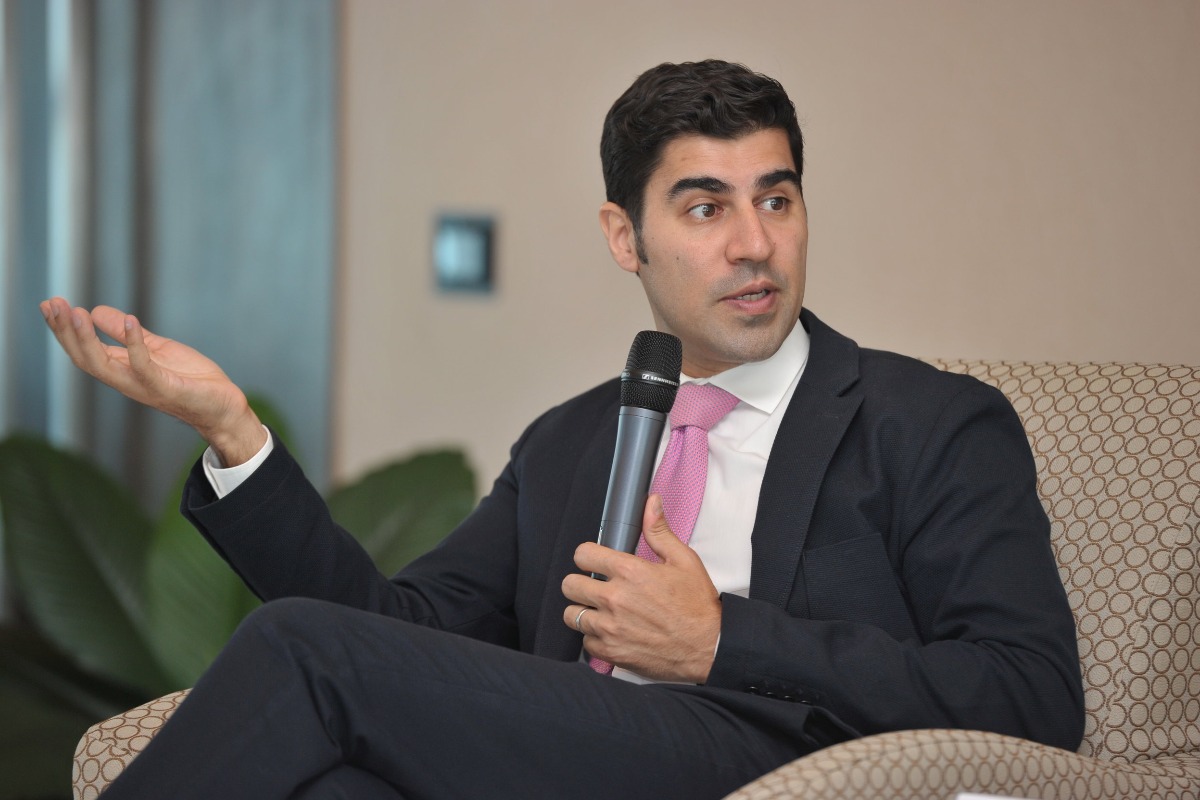
- Do you consider Eurasia as one entity, one continent, one region?
- Eurasia is a mega-continent that does not consist of one region. Even a continent like Australia is divided into many regions, so obviously Eurasia is home to many regions, and no continent has more regions than Eurasia. Scandinavia is a region, like Iberia or Anatolia. But so is Southeast Asia, or the Indian subcontinent. Every continent is made up of regions. In certain situations, these regions find themselves in increasingly tense situations with their neighbors, such as the relationship between China and Southeast Asia. The two regions have very close economic ties. Southeast Asia is China’s second largest trading partner. China’s trade expansion is clearly growing across Eurasia.
- After all, these regions and countries are still trying to protect their national viewpoints. Can countries in this vast community unite their interests?
- In what respect?
- Let’s start with the political goals. China’s intention to win is not only in terms of trade, but also in terms of gaining power.
- This is obvious. Trade and investment is the way to achieve power. It is a very old rule, nothing other than mercantilism. China is doing that indeed, but it is not the only state to use this instrument. This is how the British Empire became a world power. The question is not whether it will make China successful, but whether this success can be sustained.
- Do you think China is satisfied with the influence it has achieved? Is it possible that Beijing is trying to establish cultural dominance in the same way as the United States?
- China is a trading country, not a conquering empire. A conquering country would aim to control the life of the conquered country. China is not like that at all. Rather, it aims to use its influence to import goods from countries far away. As a result, if China is capable of, for example, importing oil or gas from Africa, it also means that China will reduce its investments in that region. Simply because it does not intend to rule the world like the British did in the 18th and 19th centuries. In this respect, the aims of a merchant state are entirely different from those of a conquering empire. However, it doesn’t mean it will not strive for hegemony.
Also as a trader, the aim is to ensure that no one interferes with the smooth operation of the supply chain or invades the territory of the country under its influence. China is arming this supply chain in exactly the same way as Britain or the United States did before. This does not mean however, that China will try to control the country in question, but rather that the country will accept what Beijing wants from them.
- As a result, does not China endeavor to (allow me use a symbol) make everyone drink ginseng tea in its zone of influence? The United States has made its own area of interest drink Coca-Cola.
- No, cultural hegemony is not possible as the world will not learn to speak Chinese. Like the language, Chinese social, cultural and political traditions will not spread to the outside world. Therefore, it is also evident that if an occasional authoritarian turn takes place in a country, it will not be the result of China’s influence, but of other factors. China does not export its ideology. I have been researching this topic for many years. For example Egypt was inclined to use the Chinese model for the sake of its own development. Under Hosni Mubarak Egypt was a military dictatorship, but it was not the intention to follow the Beijing model that made it a dictatorship. Indeed, the countries that mentioned the use of the Chinese model were just looking for an excuse to maintain the old power and not to make the necessary political-economic reforms. This is why countries invoking the Chinese model have in fact become failed states. These countries did not really follow the Chinese model, so they did not become successful. But this is not China’s fault.

- Are you optimistic about the future of the cooperation among the regions, or indeed empires, of the mega-continent?
- I don’t think we should be optimistic or pessimistic in this situation. What is more important is why and how this cooperation takes place. I believe that closer ties between Central Asia and South Asia would have positive results. For instance, if Pakistan and India worked together to stabilize Afghanistan. It won’t happen but it would obviously be a useful cooperation. It is also good for the Southeast Asian countries if their trade relations with China increase. At the same time, for instance, I believe that the endeavors of the former Soviet republics to turn towards Europe rather than Russia are not really good.
- Let’s take the example of Kazakhstan. This country is striving to become the center of Central Asia, but it is also interfering with Russia’s ambitions as it tries to move away from Russian influence. At the same time this country lies in the main area of the Eurasian route which is a power conflict zone.
- Oh yes, infrastructure can certainly be a source of conflict. It has been proven in many places, either in the case of Soviet road building projects in the republics of Central Asia or, most recently, in the case of the King Fahd Causeway between Saudi Arabia and Bahrain. When the Arab Spring erupted, Saudi tanks crossed this bridge to crush the Bahraini protests. Roads can always be used for trade and cooperation in the same way as for wars. But it is true for gas pipelines as well. There are two related scenarios in Ukraine: on the one hand, it could receive revenues as gas is piped between Russia and Europe, but if Russia turns off the tap Ukraine will not have access to fuel in winter. I should mention that the British also used infrastructure to maintain their influence in India, Southeast Asia and Africa.
- In relation to migration, the position you outlined was that people were moving from the poorer, less developed, areas of the south to the more developed northern regions. How does this migration actually work?
- This is not just migration, it is human geography. The question is where we expect people to appear, and where populations will increase in the future. In this respect climate change is clearly the most significant factor. For this reason more and more South Americans will be heading towards North America, more South Asians to Central Asia and more people of Arab origin will be migrating towards Anatolia and Europe. You can already see this happening. Previously, there were hardly any large communities of Asian origin in Europe, but that is about to change.
- At the same time, this issue is very sensitive, precisely because of the cultural differences between the countries of origin and the countries of destination. How can this be resolved?
- Look at the UK or Germany, which have become more and more multi-ethnic societies. They have recognized that this process is unstoppable. I understand their cultural concerns, but we have to see that these countries are struggling with serious labor shortages and these need to be addressed somehow.
- Do you mean workers have to be imported from abroad?
- There is no alternative as local population growth is very low. Those countries need workers.
- On the one hand, this is understandable, but let’s look at France in the middle of a presidential election campaign, and poor public safety is actually the number one issue, which is indeed the result of immigration.
- Yes, but to be honest, neither France nor Hungary is as important a factor as the United States or Britain for instance. They are much stronger, richer and economically more important. And they are multi-ethnic societies. But even in countries with strong anti-migration programs the proportion of immigrants is steadily rising.

- You live in Singapore, which is an international miracle, especially in economic terms. Let me give you an interesting example: once a local expert told me that they had halved the number of public holidays in the Chinese community, after which the Singaporean system based on productivity started to work immediately. Do you think it could work in Europe as well?
- As a former British colony, Singapore learnt everything about how the empire operated, but it didn’t work the other way round. There has been much talk that Britain might become the Singapore of Europe after Brexit. Of course, this is particularly ironic given that the distribution of power used to be the reverse. Singapore has a very strong focus on trade, and its immigration policy targets people for the jobs that need to be done. British policy is exactly the opposite, and there are thousands of vacancies for lorry drivers because there aren’t
enough people to do the work. Britain has a lot to learn from Singapore, but more in terms of political governance than in terms of the social system. At the same time, I have a feeling that Europe in general can learn a lot from Asia, for example in dealing with Covid.
- Has Asia handled the pandemic better?
- Absolutely. Of course, there are differences.. In India, for example, we have had a terrible situation, but if I take Japan, South Korea, Singapore or Australia as examples, you can see that democratic states have also been very successful and effective in dealing with the disease and managed the situation in a transparent way.
- In Asia, however, the population is generally much more disciplined than in Europe, so it is easier to prevent the spread of the virus if people feel that the government has the country’s welfare at heart. Europe thinks differently. Is it still possible to offer effective protection?
- Asia already experienced the spread of the SARS virus in 2003. People remember and know that it causes serious illness. Indeed, people in Asia trust their governments. In Europe, the opposite is true. When a freely elected European government proposes a solution, people do not believe it.
There is also cultural solidarity and community work, which is absent in individualistic societies. I believe, these are the three basic factors that have resulted in more successful defense in Asia.
- Do you consider the actions of the European Union in relation to the pandemic and the subsequent economic crisis acceptable?